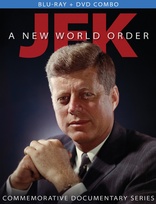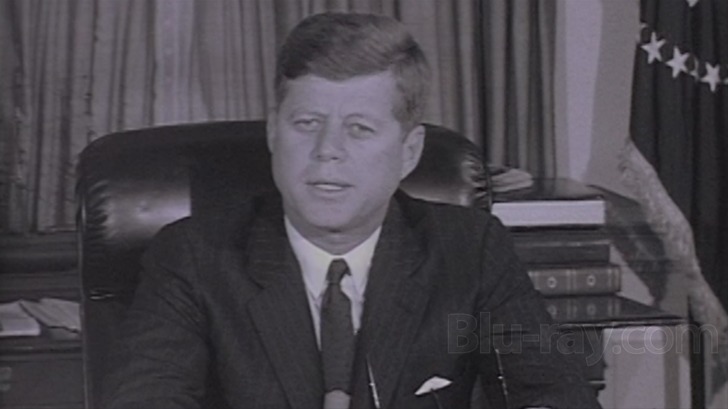JFK: A New World Order Blu-ray Movie
HomeJFK: A New World Order Blu-ray Movie 
Blu-ray + DVDMill Creek Entertainment | 2013 | 216 min | Rated TV-PG | May 14, 2013

Movie rating
6.9 | / 10 |
Blu-ray rating
| Users | 3.0 | |
| Reviewer | 3.0 | |
| Overall | 3.0 |
Overview
JFK: A New World Order (2013)
An eight-part chronicle of JFK's life and Presidency.
Starring: John F. Kennedy, Richard NixonNarrator: Gordy Burdo
Director: Jason Spafford
| Documentary | 100% |
Specifications
Video
Video codec: MPEG-4 AVC
Video resolution: 1080i
Aspect ratio: 1.78:1
Original aspect ratio: 1.78:1
Audio
English: Dolby Digital 2.0 (448 kbps)
Subtitles
None
Discs
50GB Blu-ray Disc
Three-disc set (1 BD, 2 DVDs)
DVD copy
Playback
Region A, B (C untested)
Review
Rating summary
| Movie | 3.5 | |
| Video | 3.0 | |
| Audio | 2.5 | |
| Extras | 3.5 | |
| Overall | 3.0 |
JFK: A New World Order Blu-ray Movie Review
A solid primer for basic JFK history.
Reviewed by Martin Liebman August 5, 2013A man of many contradictions.
If JFK: A New World Order were a book instead of a Documentary, it might be one of the kid-oriented paperbacks Scholastic sells at book fairs,
not a hefty academic text.
That is, it covers the basic information in an agreeable, straightforward manner, lacking much insight and certainly absent significant depth but offering
its viewers a satisfying glimpse into the life and times of America's 35th President and one of the nation's most beloved historical figures. And there's
nothing wrong with that. In fact, A New World Order is a well put-together, though certainly very straightforward and low budget,
Documentary that deals mostly with Kennedy's Presidency and the massive amount of history that played out during his all-too-brief time in office.
From his 1960 run and win and on through to his determination to expand the space program, maneuvering through the Cuban Missile crisis, and
fighting for civil rights, the film chronicles Kennedy's presidency -- and all that was packed into it -- with broad strokes but nevertheless enough detail
to teach today's generation the basics or refresh the memories of those who still remember the rise and fall of Camelot.

Mr. President.
Though the absence of depth is a bit disappointing, the filmmakers have done a good job of conveying the basics and never losing a fast pace. The film's individual segments move by quickly and don't overflow with information but are defined by a quality combination of historian interviews, narration, still photographs, film clips, and extended archival highlights from speeches, debates, and so forth. The documentary chronicles Kennedy's early life and rise in political stature, from his days at Harvard and his participation in World War II and on through his time in elected office before ascending to the Presidency and taking that office on January 20, 1961. It captures the highlights of his two years and ten months in office, from his historical inauguration speech to his tragic assassination in Dallas, Texas on November 22, 1963. Finally, it studies the Kennedy legacy then, today, and tomorrow.
Episode summaries are as follows:
- Early Years: Part one takes a look at Kennedy's early life of wealth and privilege. It also briefly studies his grandparents, his maternal grandfather, once Mayor of Boston, and his paternal grandfather, a liquor importer. The piece examines his interest in politics at Harvard and his departure from his father's political points of view. It focuses on his enlistment in the military and command of the famous PT-109, with emphasis on the ordeal's shaping of his image. It then transitions to the difficulty he found in adapting to political life, discovering his style and voice along the campaign trail, the flourishing of his family, his role in the senate and his televised rise to fame during a congressional investigation of a racketeering scandal, and his place at the 1956 Democratic national convention. It also touches his authorship of Profiles in Courage.
- For All to See: A closer look at the 1960 campaign, including the expanded role of television coverage of the election. It focuses on Kennedy's appearance on television, Kennedy's deeper understanding of how to best utilize the medium over his opponent, and the contrast between Kennedy's and Nixon's looks. It also covers the split in the party and some of the electorate's uncertainty with his candidacy, not only concerning his policies but his frail health, religion, and inexperience. It also looks at his tackling of domestic and foreign issues and his tight 1960 Presidential election victory and the television coverage of it.
- New Frontiers: Part three begins with JFK's inaugural address ("ask not what your country can do for you but what you can do for your country") on a chilly Washington day. After a year, his Presidency accomplished little, though he did create the Peace Corps, which the film details. It examines in great detail -- with lengthy speech highlights -- his goal of landing a man on the moon and expanding the U.S. Space Program as part of the race and challenge against Communism and as a part of the larger Cold War.
- Doomsday Averted: As the title suggests, this segment studies Kennedy's role in averting nuclear disaster. It examines his role in the "Bay of Pigs" incident as part of an intelligence effort to remove Communist influence on the island nation and dealing with the aftermath of failure. Part four continues with a detailed history of Kennedy's involvement in the Cuban Missile Crisis. Finally, the segment focuses on Kennedy's push for détente.
- A Wall of Worlds: A closer look at the American and Russian influences on Europe after World War II, with a focus on the construction of the Berlin wall, separating the Communist East and the free West. It shows highlights from Kennedy's address to the nation after the wall's construction as well as his famous speech in Berlin ("Ich bin ein Berliner").
- War Within & Without Part One: This segment opens with an examination of Kennedy's role in the civil rights movement. It highlights the complications that arose from communist infiltration of the civil rights movement and the domestic and foreign policy challenges that were a result of the civil rights movement. It looks at the turning point for his further involvement in the movement: Alabama Governor George Wallace's ordered blockage of the entrance to the University of Alabama to keep two black students, Vivian Malone and James Hood, from attending classes. It also looks at Lyndon Johnson's future pushes for civil rights.
- War Within & Without Part Two: An examination of foreign policy in the nuclear and Cold War era. The piece focuses on Kennedy's concern with Southeast Asia: the origins of what would become the Vietnam Conflict. Kennedy searches for options to deal with the risks of both expanded involvement in or a departure from the theater, with emphasis on the inevitable "Domino Effect" of further Communist expansion in the region. Expanding the role of American military influence in the region, the propaganda war that was a result, and the Kennedy policy of "working for peace but preparing for war" are also studied.
- Camelot & Beyond: A closer look at the Kennedy family, including Jacqueline Kennedy's role in JFK's Presidency and her greater influence on the 1960s style scene. Kennedy's frail health, his affairs, the assassination, and his legacy are also featured.
JFK: A New World Order Blu-ray Movie, Video Quality 

JFK: A New World Order is another Documentary crafted from a variety of sources. There are color and black-and-white still photographs, which in totality look quite nice, sharp and true and, where applicable, nicely colored and era-authentic. There's also a myriad of film and video sources, with the film holding its own at the increased Blu-ray resolution but obviously showing signs of age, some more so than others. The video and television broadcast footage ranges from acceptable to downright poor, wavy and distorted in places. As always, this older footage doesn't factor into the score. The only real new footage comes from a few still shots and interview snippets. There's little life to these elements; the interviews appear rather flat and revealing of only basic definition and details. Skin textures are not flat but they lack the complexity that top-end HD video is capable of displaying. Colors, too, follow suit; they're not bland but there's no brilliance, either. For a smaller-scoped Documentary and a budget Blu-ray release, this transfer is more than capable.
JFK: A New World Order Blu-ray Movie, Audio Quality 

JFK: A New World Order arrives on Blu-ray with a Dolby Digital 2.0 soundtrack. There's zero range beyond a bit of stretch out to the sides for musical pieces. Militaristic beats enjoy a little more heft. Clarity is never lacking, but listeners certainly won't mistake the track for a live band. Dialogue ranges in quality from source to source. Newly recorded narration and historian interviews never sound too terribly detached, but there's no sense of realistic clarity, either. Placement is, at least, consistent. Older footage, unsurprisingly, lacks crispness and definition but is, for the most part, fully intelligible save for a few excessively scratchy moments. All in all, this is a track that gets the basics done well enough, and that's all this material requires.
JFK: A New World Order Blu-ray Movie, Special Features and Extras 

JFK: A New World Order includes a DVD copy of the documentary as well as a bonus DVD with the following features:
- Kennedy vs Nixon Presidential Debate (SD, 58:44): The second debate in its entirety.
- Assassination of President John F. Kennedy (SD, 20:48): A vintage black-and-white film chronicling the event after the fact.
- Funeral Service of President John F. Kennedy (SD, 43:05): A vintage color film chronicling the event.
- Vietnam! Vietnam! by John Ford (SD, 58:02): A film chronicling the war, narrated by Charlton Heston.
JFK: A New World Order Blu-ray Movie, Overall Score and Recommendation 

JFK: A New World Order probably isn't even deep enough for college classrooms, but for middle or high school teachers looking for a solid overview of a Presidency or the major highlights therein, this Documentary is hard to beat. With eight separate features that run around 26 minutes each, it's a highly efficient JFK primer that gets the information out there in an agreeable, easily understood fashion. Look elsewhere for depth, but don't look anywhere else for the basics. Four terrific bonus features and adequate video and audio support a quality release. Recommended; the supplements will particularly appeal to students of history.
Similar titles
Similar titles you might also like

Shark Divers: Documentary Collection
2012

Island of Lemurs: Madagascar 3D
2014

To the Arctic 3D
IMAX
2012

The Crimson Wing: Mystery of the Flamingos
Disneynature
2008

Jerusalem 3D
2013

Bears
Disneynature
2014

Winged Planet 3D
2012

James Cameron's Deepsea Challenge 3D
2014

Wings of Life
Disneynature
2011

Babies
Bébé(s)
2010

Arctic Tale
2007

African Cats
Disneynature
2011

Glee: The Concert Movie
2011

Celebrating Mickey
1928-2013

A LEGO Brickumentary
2014

Flying Monsters 3D
2011

Katy Perry: Part of Me 3D
2012

Monkey Kingdom
Disneynature
2015

Expelled: No Intelligence Allowed
2008

Shark Week: 25th Anniversary